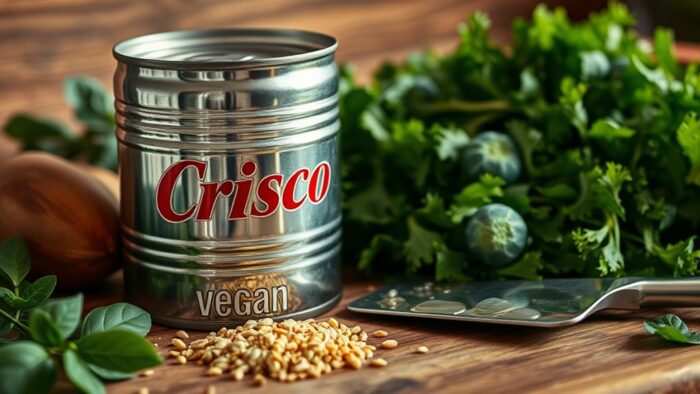Are Donuts Vegan?

If you’re wondering whether donuts can fit into your vegan lifestyle, you’re not alone. Many people are curious about what goes into their favorite treats and whether they can enjoy them without compromising their dietary choices. It’s important to know that traditional donut recipes often include eggs and dairy, which can be a deal-breaker for those seeking plant-based alternatives. However, the good news is that there’s a growing trend of bakeries and stores offering tasty vegan donuts. Brands like Doughnut Time and Greggs even make it easy to identify their vegan options. Plus, if you’re feeling adventurous, there are simple recipes available for making your own vegan donuts at home. Ready to dive deeper into the world of vegan donuts? There’s a lot more to analyze!
Understanding Traditional Donuts

Traditional donuts are a beloved treat enjoyed by many, but it’s important to understand the ingredients that contribute to their rich flavor and texture. Classic donut recipes typically include animal-derived ingredients such as eggs, milk, and butter. These components are crucial in creating the moist and flavorful experience that donut lovers appreciate.
Eggs, for instance, serve a dual purpose in donuts. They not only help with aeration, giving the donut a light and airy quality, but also act as a binding agent, confirming that the ingredients hold together well. This is true for both yeast-based and cake donuts.
The inclusion of dairy products like milk and butter improves the overall taste and texture, making each bite satisfying. Additionally, many popular toppings and fillings, such as custards and creams, often contain eggs and dairy, which further solidifies the non-vegan status of traditional donuts.
It’s also worth noting that the sugar used in donuts may be processed with animal byproducts, adding another layer to the complexity of the ingredients.
Identifying Non-Vegan Ingredients

To determine whether donuts align with a vegan lifestyle, it’s important to recognize the non-vegan ingredients commonly present in these baked goods. Traditional donuts often contain eggs and dairy, which boost their texture and flavor. Ingredients like butter, milk, and powdered milk are frequently used for moisture and richness.
In both yeast and cake donut recipes, eggs serve a crucial function by providing aeration and binding, essential for maintaining the donut’s structure. Additionally, the sugar used in many donuts can pose a concern, as some sugars are processed with bone char, making them unsuitable for strict vegans.
When it comes to fillings and toppings, such as custards and creams, these often incorporate eggs and dairy as well, further increasing the likelihood of animal byproducts in your donut.
Spotting Vegan Donuts in Stores

If you’re looking to find vegan donuts while guiding through store aisles, there are a few straightforward strategies to make your search easier.
First and foremost, always look for donuts that are explicitly labeled as “vegan.” This labeling assures that the donuts don’t contain any animal-derived ingredients, such as eggs or dairy.
Many popular bakeries, like Doughnut Time and Greggs in the UK, clearly highlight their vegan options, which can help simplify your choices.
In addition to bakeries, many supermarkets, including Co-op, Tesco, and Marks & Spencer, have dedicated sections for vegan products, including donuts. These sections can significantly simplify your search for plant-based treats.
When examining the ingredients list, keep an eye out for common non-vegan components like milk and eggs.
Additionally, be aware that some sugars may be processed using animal byproducts, so it’s worth checking for that information as well.
If you prefer shopping online, many local vegan shops offer a wide range of options, often including detailed descriptions that can help you understand the ingredients better.
Some even provide gluten-free choices, catering to more dietary needs.
Vegan Donut Options in Bakeries

Looking into vegan donut options in bakeries can be a rewarding experience, as it highlights the increasing variety and creativity in plant-based treats.
In the UK, many bakeries, such as Doughnut Time and Greggs, now offer a selection of vegan donuts, which are clearly labeled with (VG) on their menus for easy identification.
For those seeking artisanal choices, Crosstown Doughnuts stands out with its unique flavors that cater to a range of preferences, including delicious vegan chocolate options.
In major cities like London and New York, dedicated donut shops focus on providing a wide variety of vegan donuts, making sure that there’s something for everyone.
Additionally, supermarkets like Co-op and Tesco have recognized the demand for vegan options, making it easier for consumers to find vegan donuts in their local stores.
This accessibility allows you to indulge your sweet tooth without compromising your dietary choices.
How to Make Vegan Donuts at Home

Making vegan donuts at home is a straightforward and enjoyable process, allowing you to create delicious treats while adhering to a plant-based lifestyle. Here’s a comprehensive guide on how to make these delightful donuts from scratch:
1. Choose Your Ingredients: Start with plant-based milk, such as soy or almond milk, as a base for your donut batter. Instead of traditional eggs, opt for substitutes like mashed bananas, unsweetened applesauce, or a mixture of flaxseed meal and water to achieve the desired binding and moisture.
Each of these ingredients not only serves a functional purpose but also adds a unique flavor to your donuts.
2. Use Leavening Agents**: To achieve the perfect texture in your vegan donuts, incorporate leavening agents like baking powder or yeast. Baking powder will provide a quick rise, making your donuts light and fluffy, while yeast can offer a more traditional, airy quality**.
Understanding the role of these agents will help you choose the right one based on the recipe you’re following.
3. Experiment with Flavor and Toppings: One of the joys of making vegan donuts is the ability to customize flavors and toppings. You can infuse your batter with vegan chocolate, vanilla extract, or citrus zest for added depth.
Additionally, consider creating fruit glazes or using vegan-friendly sprinkles to promote the visual appeal and taste of your donuts. This experimentation allows you to create unique varieties that cater to your personal preferences.
Popular Vegan Donut Brands and Choices

Once you’ve perfected your vegan donut recipe at home, checking out the variety of vegan donut options available from different brands can be an exciting next step.
Krispy Kreme has recently introduced a vegan option with their iced ring donut, which is a great choice for those looking to satisfy their sweet cravings without animal products.
Doughnut Time stands out with a menu that clearly marks vegan (VG) donuts, making it easy for customers to identify their plant-based choices. This transparency helps assure that you can indulge with confidence.
Greggs, a popular chain, also offers a glazed vegan donut that’s worth trying for its delightful taste and texture.
If you’re interested in artisan-style donuts, Crosstown Doughnuts specializes in vegan offerings that are crafted with unique flavors, ideal for those who appreciate gourmet treats.
Additionally, major supermarkets like Co-op, Tesco, and Marks & Spencer have launched convenient lines of vegan donuts, making it simple to grab a delicious treat while shopping.
These brands and options illustrate the growing availability of vegan donuts, making it easier than ever to enjoy a sweet snack that aligns with a plant-based lifestyle.
Whether you’re at home or out and about, there are plenty of delicious vegan donut choices to satisfy your cravings.





